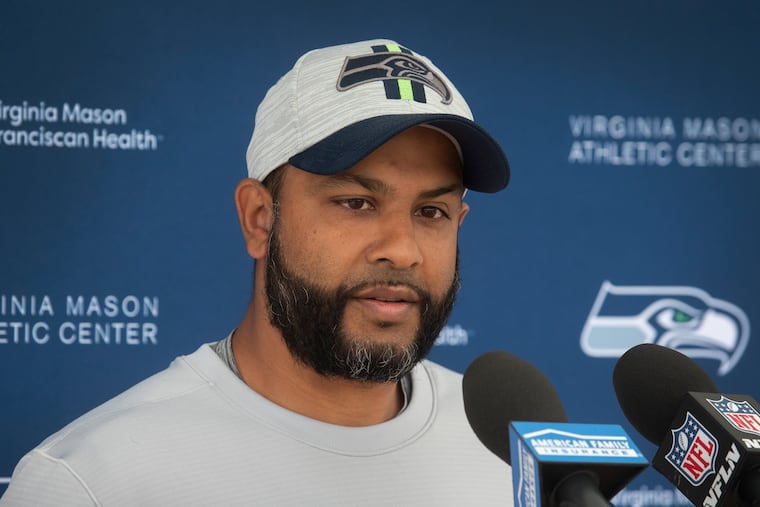How Temple helped shape new Eagles defensive coordinator Sean Desai
Desai's time on North Broad also played a role in how he approaches his work and passion for social justice initiatives.

Sean Desai had a five-word question for his audience.
What’s it worth to you?
For years, Desai told Temple University’s College of Education and Human Development during a 2022 commencement speech, he has used that question “as a recalibration of perspective.”
The Connecticut native and graduate of both Boston University and Columbia University came to Temple in 2007 for two purposes: to advance his education and continue a coaching career that is bringing him back to Philly.
Desai, 39, was named the Eagles’ new defensive coordinator on Tuesday, but 15 years ago he was a college grad with high school football coaching experience still trying to find his place in the world and in football.
Desai, who most recently served as the Seattle Seahawks’ associate head coach and defensive assistant during the 2022 season, was a graduate assistant at Temple from 2007 to 2010 for the Owls’ defense, special teams and academics. He also worked toward his doctorate at Temple, and earned it in educational administration with an emphasis in higher education in May 2008. He continued working on Al Golden’s staff while also teaching as an adjunct professor in the masters and doctoral programs in educational administration.
» READ MORE: Source: Eagles promote QB coach Brian Johnson to offensive coordinator
Desai followed Golden to Miami in 2011, leaving Philadelphia and starting a rapid ascent up the coaching ranks that eventually landed him as the Chicago Bears’ defensive coordinator 10 years later. Desai held that job for one season before joining the Seahawks.
Desai is a football coach, yes, but maybe accidentally.
“I got my degree wanting to enter the academic ranks and eventually create social change,” he said during that keynote speech to Temple graduates. “What I didn’t know then is that I’d be doing that on the football field.”
His goal hasn’t changed. While with the Bears, Desai, the son of Indian immigrants, regularly fielded emails from Indian-Americans seeking advice and details on how he became the first Indian-American coordinator in NFL history.
In June 2020, in the aftermath of the murder of George Floyd and racial justice protests around the country, Desai wrote in The Athletic that he was “choosing not to stand by and tacitly allow immoral, inhumane behaviors.
“I’m trying to be more brave and courageous,” Desai wrote. “My experiences earning a doctorate, being a professor in education and leadership, and coaching football in the NFL and college have allowed me to study and witness systems of injustice in various ways.”
He provided a call to action, and urged others “to renew our social contract with each other and pledge to act (PACT) for justice.”
While at Temple, Desai said he researched the worth of higher education. He examined the economic values of degrees and took a closer look at the doctorate of educational administration he was pursuing. The result, Desai said: the higher the degree you earn, the more financial value you garner.
“What I failed to realize back then and have since learned, is that your degree is more than a credential that earns you higher pay,” Desai said during his speech at Temple. “But only if you understand its real worth.”
» READ MORE: Jalen Hurts was almost perfect in the Super Bowl for the Eagles. Pay him. $250 million, guaranteed.
Along the way, through stops in Miami, Boston, Chicago, and Seattle, Desai said his education has helped him obtain higher positions with more impact.
“I’m in a better position to fulfill what my education was actually worth to me: to help provide access, equity and opportunity to others,” Desai said.
“See, the beauty of your journey is that the ways you’re going to use your degree may not be clear to you. Truthfully, you may not even know what your next job will be, and that’s OK. Because in the end it doesn’t really matter. What matters is that you have a clear understanding of what you want to accomplish.”
In other words, what it’s all worth.
“What you’ve earned is access, and what you have is an opportunity,” Desai said. “What you can create is impact.”